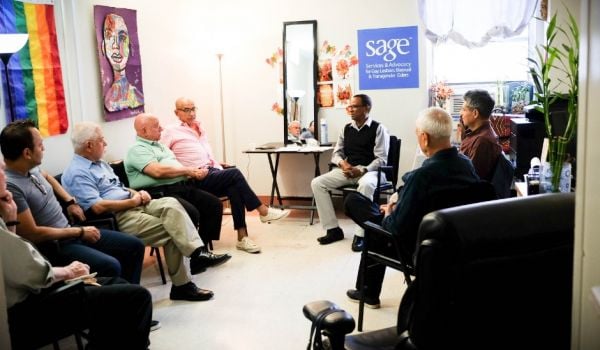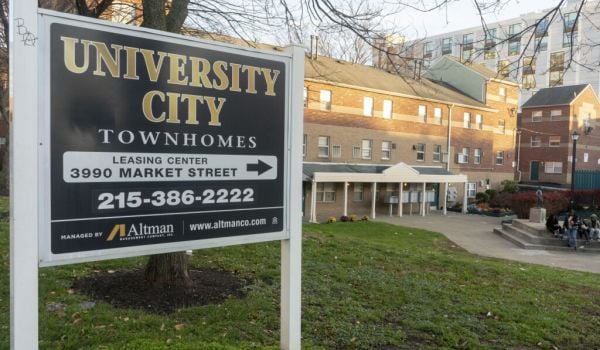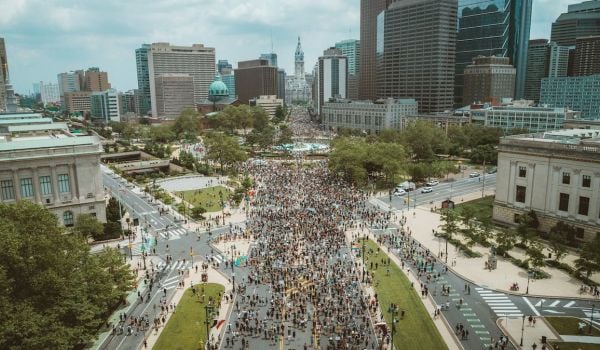Welcome to The Weekly Wrap, our Friday round-up of stories that explain the problems oppressing people in cities and elevate the solutions bringing us closer to economic, environmental and social justice.
We’re getting closer to the early bird deadline (April 1st at at 11:59 p.m. Eastern) for our 16th annual Vanguard conference, which is taking place in Lexington, Kentucky this fall. The final deadline is May 6th. Learn more and apply here!
Philadelphia Program Reimagines Housing Vouchers As Cash Payments
A Philadelphia program allows some people on a very long waitlist for federal housing vouchers to instead access state-provided money through a debit card, NPR reports. The 300 participants in the pilot project, called PHL Housing +, receive a monthly allowance for two and a half years that is equal to what they would receive in HUD’s rent subsidies, or the difference between 30% of their income and the cost of their rent. But unlike a Section 8 voucher, the funds are unrestricted and can be used for anything. “This provides a more flexible resource for participants to make their own decisions to meet their family’s needs,” according to PHDC. The program is funded through a combination of private donations and public money, according to NPR.
Speed Camera Enforcement Under Scrutiny
A new report from the Fines and Fees Justice Center criticizes the increasing trend of automatic speed camera enforcement. While speed cameras have been credited with saving lives, the report questions whether they reproduce the problems of traffic tickets from police officers. While supporters say the cameras reduce police contact, according to the report, “automated enforcement does not stop officers from profiling Black or Brown drivers and targeting them for traffic-based stops.” The report authors told Streetsblog that while there’s evidence that speed camera placement led to reduced crash injuries, no study has proven that the fines themselves are decreasing crashes and that the reduction of injuries may be due to the mere presence of cameras. According to Streetsblog, road signs that display speeds alone helped to reduce cars’ velocity by 30 to 50%.
Milwaukee County Uses Opioid Settlement Funds for Prevention and Harm Reduction
Milwaukee County is putting $100 million of opioid settlement money that it received between 2021 and 2023 into prevention and treatment programs, Governing reports. The county funded 15 projects including harm reduction kits including naloxone, medication-assisted treatment for incarcerated people and funding to community-based organizations. It also funded increased staffing for medical examiner offices. The county had 606 fatal opioid overdoses in 2023, according to its opioid dashboard, a slight decrease from 655 the year before.
Chicago Real Estate Transfer Tax Faces Slim Odds
A Chicago ballot referendum for a real estate transfer tax meant to fund homeless initiatives appears close to being rejected by the city’s voters. The “Bring Chicago Home” initiative tallied 54% “no” votes and 46% “yes” votes as of Tuesday, according to NBC Chicago. Nearly 110,000 vote-by-mail ballots — or about 26% of the total vote — had not been counted yet. (The Board of Elections said the number of ballots returned by voters could be lower due to overall poor turnout.) The ballot initiative would have reduced the real estate transfer tax for home sales under $1 million by 20%, increased the rate for home sales above $1 million by 166% and increased the rate for sales above $1.5 million by 300%. The revenue would go to “addressing homelessness, including providing permanent affordable housing and the services necessary to obtain and maintain permanent housing in the City of Chicago,” according to the bill language.
Connecticut Proposes Surcharge on Fossil Fuel Insurers
According to Grist, a bill in the state’s senate would create a proposal for a surcharge on insurance companies insuring fossil fuel infrastructure, like gas pipelines or natural gas power plants. The money would be used for climate resiliency infrastructure. According to Grist, insurance companies have “a unique role on both sides of the climate crisis” as they insure fossil fuel producers but have disincentivized overdevelopment by exiting markets in flood and fire-prone areas en masse. Supporters of the legislation, which was voted out of committee in the state senate, believe it could raise tens of millions of dollars.
Curated by Deonna Anderson
MORE NEWS
-
Paris pours billions into its public housing, helping to keep lower-income Parisians — and their businesses — in the city. New York Times
-
The Department of Justice is investigating whether the biggest landlords in the U.S. are working together to price fix, which prevents competition and raises rents. Politico
-
Communities are hoping to build disaster resilience — and they’ve requested a record $8 billion in FEMA grants. Smart Cities Dive
RESOURCES & OPPORTUNITIES
-
The Othering & Belonging Institute released its Transformative Research Toolkit this week. The toolkit is designed for cultural workers, organizers, and community leaders to “support change strategies using processes that center local community knowledge.” Access the resource here.
-
The Independent Projects grant program is awarding grants to New York State-based individuals and teams to explore a design topic through creation or research. For the 2024 cycle, this program will award 25 grants of $10,000 to proposals in design fields including architecture, landscape architecture, biodesign, historic preservation, community-centered design, fashion, graphic, industrial, and interior design. Applications will be accepted through May 22, 2024. Learn more and apply here.
EVENTS
-
March 27 at 1 p.m. Eastern: Los Angeles is running the biggest Universal Basic Mobility program in the nation. Join this Next City webinar to learn how cities and transit agencies can launch their own UBM programs to increase economic opportunity and mobility for underserved communities. Register here.
-
We partnered with fellow media organization Reckon for a powerful conversation examining the ongoing struggles for a safe environment in Black communities. Watch the replay here.
This article is part of The Weekly Wrap, a newsletter rounding up stories that explain the problems oppressing people in cities and elevate the solutions bringing us closer to economic, environmental and social justice. Click here to subscribe to The Weekly Wrap newsletter.

Roshan Abraham is Next City's housing correspondent and a former Equitable Cities fellow. He is based in Queens. Follow him on Twitter at @roshantone.



















Add to the Discussion
Next City sustaining members can comment on our stories. Keep the discussion going! Join our community of engaged members by donating today.
Already a sustaining member? Login here.